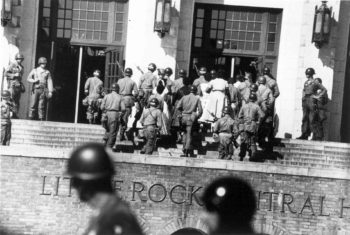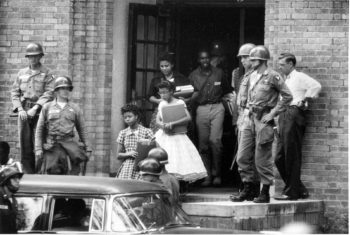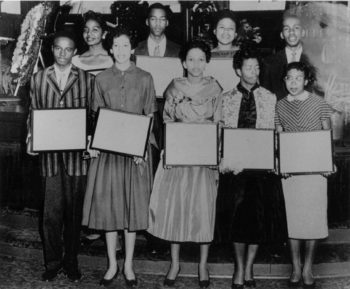Highlighting the Little Rock Nine Interviews

by troops from the 101st Airborne Division, September 1957. (©Burt Glinn/Magnum Photos) Washington University Libraries, Henry Hampton Collection
This month, Special Collections Blog will be highlighting a few of our many collections on African American history. Some of our most interesting material comes from the Henry Hampton Collection and the interviews he conducted for his fourteen-part PBS documentary series, Eyes on the Prize. Eyes on the Prize is considered to be the definitive documentary on the Civil Rights Movement and has won more than twenty major awards for its in-depth coverage and extensive interviews with key figures in the movement.
Since it would be impossible to cover all of the material in Eyes on the Prize, today we will be focusing on interviews pertaining to the Little Rock Nine. The digital projects for Eyes on the Prize Series I and Eyes on the Prize Series II make the uncut versions of these interviews, which contain footage that did not make it into the finalized documentary, available to scholars, researchers, and historians.
About the Little Rock Nine
Almost exactly 60 years ago, in the fall of 1957, nine African American students matriculated into Central High School in Little Rock, Alabama. The Little Rock School Board was complying with the recent Supreme Court decision, Brown vs. Board of Education, which in 1954 had declared segregated schools to be unconstitutional. The Eyes on the Prize digital collection has video interviews conducted in 1985 with two of these nine students, Melba Pattillo and Ernest Green.
Neither Green nor Pattillo expected there to be any issues surrounding their enrollment since other schools in Arkansas had been integrated before, and they were looking forward to the greater opportunities and resources Central High School could offer. However, on September 4, 1957, when they were supposed to begin school, the governor of Arkansas, Orval Faubus, deployed the Arkansas National Guard to prevent the students from entering, citing danger of riots. You can watch the Eyes on the Prize interview with Faubus here.
It was not until the federal government got involved that the students were finally able to enter the school nearly a month later under the protection of the 101st Airborne Division of the United States Army, but that was not the end of the story. As Melba Pattillo puts it, “The troops, however, did not mean the end of harassment. It meant the declaration of war.”
A Hostile First Year

under federal guard. (© George Silk / Time) Washington University Libraries, Henry Hampton Collection
Throughout the school year, white students continued to harass the Nine, lighting books on fire, covering everything in their lockers with ink, and hurling slurs at them. Even when they were at home they were not free from harassment, because they would receive threatening phone calls to their houses. Melba Pattillo describes a particularly horrific episode in which a student sprayed acid in her face with a water gun, but thankfully her bodyguard, one of the federalized soldiers assigned to protect the students, ran her head under water immediately and she was able to avoid permanent damage.
In 1958, Ernest Green, who had entered Little Rock as a senior, became the first of the nine to graduate from Central. After his graduation, the governor shut down the Little Rock High Schools for a year to all students, but two of the other African American students would manage to graduate from Central over the next two years, while the rest ended up at other schools.

Ernest Green claims that while he recognized the impact he was making on the community in Little Rock even while he was a student there, it was not until later that he realized how significant the nine of them were to the larger civil rights movement. Over the years, he has had multiple people tell him about how the media coverage of Little Rock changed their minds about segregation. The Eyes on the Prize collection also contains an interview with Craig Rains, a white student at Central High School who talks about how what he witnessed changed his views on integration.
More Information
For more on the Little Rock Nine, we encourage you to watch the interviews linked in this article, or you can check out the Library Catalog for DVDs of the completed Eyes on the Prize documentary. Be on the lookout for more posts about Black history this month!
